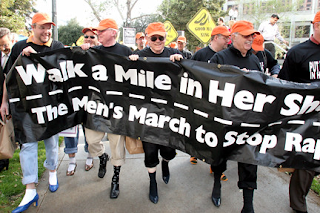My second concern, which is related to the absurd worry about the feelings of women, is the near-total disregard for the concerns and experiences of male students.
Men at university are told in no uncertain terms that they are uniquely guilty, prone to violence, and responsible for war, inequality, rape, domestic violence, pedophilia, sexual harassment, hetero-patriarchal-capitalistic domination, and all that is wrong in society. A young man entering university today soon learns that he is a second-class citizen in terms of rights, financial aid, freedom of inquiry, and social support.
His female colleagues enter a pro-woman campus culture where they see positive images of women in everything from advertising campaigns to course textbooks, where they outnumber their male peers by a significant margin, are taught by pro-feminist teachers dedicated to female success, are provided with women-only spaces to meet, can take advantage of a plethora of special scholarships and bursaries for female students, can access feminist counselling if they so desire, are encouraged to learn about and write papers on women’s achievements and issues, are instructed in righteous anger against the wrongs done to women, can take self-defense classes designed specially for women, are given the opportunity to celebrate female sexuality in campus productions like the Vagina Monologues, and in a multitude of other ways are told that their experiences and concerns matter at the university.

He will learn that there
are women-only spaces where he must not intrude and female
sensitivities that he must not offend. If he wishes to write a paper
about men’s problems or perspectives, it is unlikely that he will
be encouraged to do so or will encounter an instructorwho knows
anything about the topic or even believes in its legitimacy. Although
men are a minority in many of his courses, he will not find any
special scholarships or bursaries to redress the imbalance. If he
tries to form a men’s
issues club or wishes to meet with other men in a male-only space
to discuss his experiences as a man, he will be told that he is a
misogynist, that his very presence on campus is a potential threat to
women, that the final word on gender has already been determined by
feminists, and that he should shut up and listen to women’s
accounts and demands.
Hearing such a summation,
you might be inclined to think that I am exaggerating, and it is true
that not every man will claim the above as his experience, but the
structural inequities that I have identified are a demonstrable
reality.
My third concern is that
as a result of the over-sensitivity to women’s feelings and the
knee-jerk hostility or at least indifference to men’s, a host of
asymmetrical and unjust policies and practices have been put in place
on university campuses, many of which not only sideline men and
restrict their right to self-expression but actually threaten their
well-being and livelihoods in profound ways.

Instead of letting the
police and courts deal with such accusations, as they should, most
universities have now set up quasi-judicial
panels to investigate charges of sexual assault or harassment.
The panels are made up of members of the university community with no
legal training. The accused is routinely denied the right to counsel,
the right to know what evidence has been brought against him, the
right to confront his accuser, and other fundamental legal
guarantees. And the panels have serious power: men face expulsion, a
permanent blot on their academic records, an indelible stain on their
reputations, and in many cases the death of their career dreams. It
is almost inconceivable that this is happening now in a culture that
once prided itself on such principles as equality before the law and
the presumption of innocence.
In the name of making the
university a “safe space,” we are absolving women of
responsibility for their actions and severely compromising the legal
rights and freedoms of men. This is a far cry from the individual and
sexual liberation claimed by the student radicals of the 60s. Where
it will all end is anybody’s guess, but it is clear that the
feminist agenda is incompatible with the academic ideal of truth and
the social ideal of justice. The obsession on campus with female
trauma and male aggression, the constant harping on the need to
promote women, salve their wounds, and make up to them for the
supposed evils of the past and present—all of these have almost
nothing to do with the pursuit of knowledge and are not only a
distraction from that pursuit but are actually a serious impediment
to it. It is time that people of good conscience took a stand against
this corruption of our universities and of our larger society.
Originally published August 13, 2015
Updated October 29, 2021





No comments:
Post a Comment